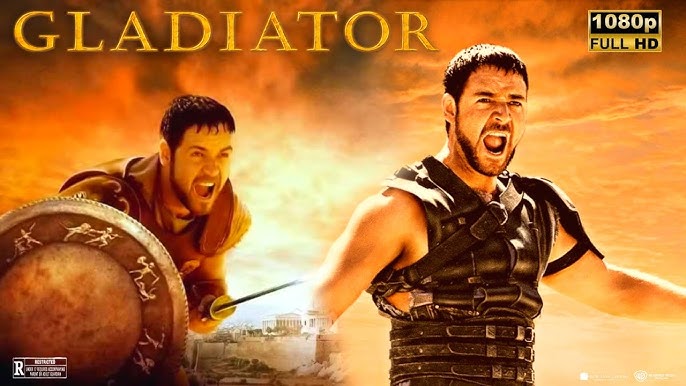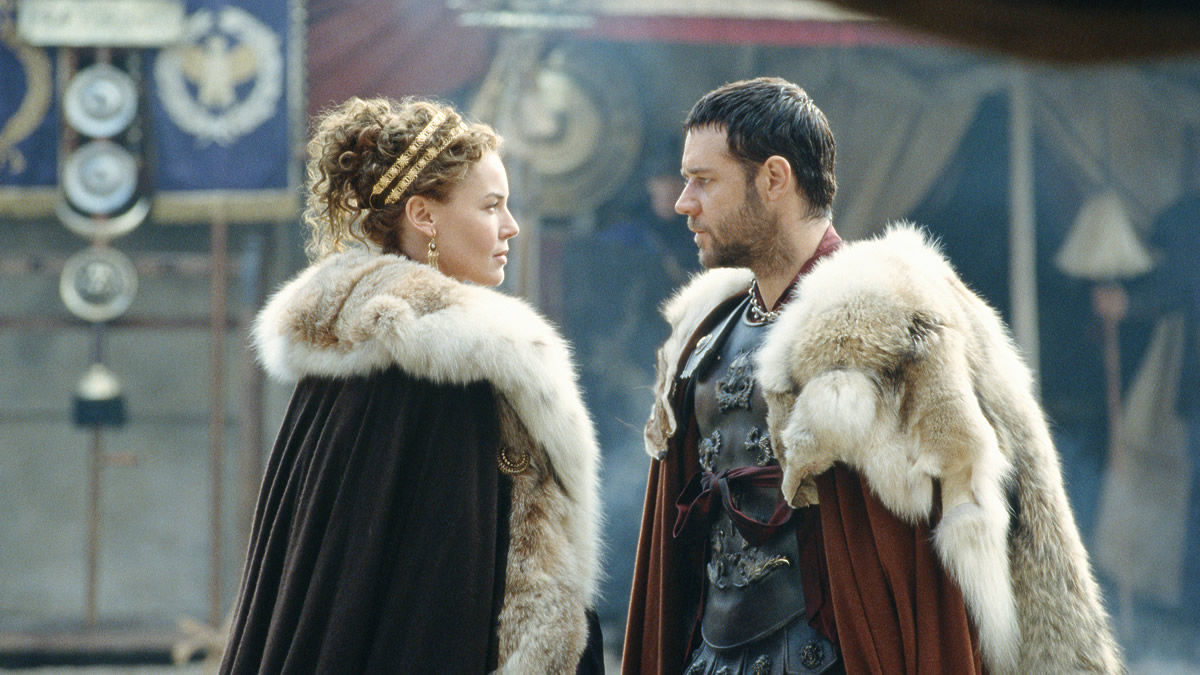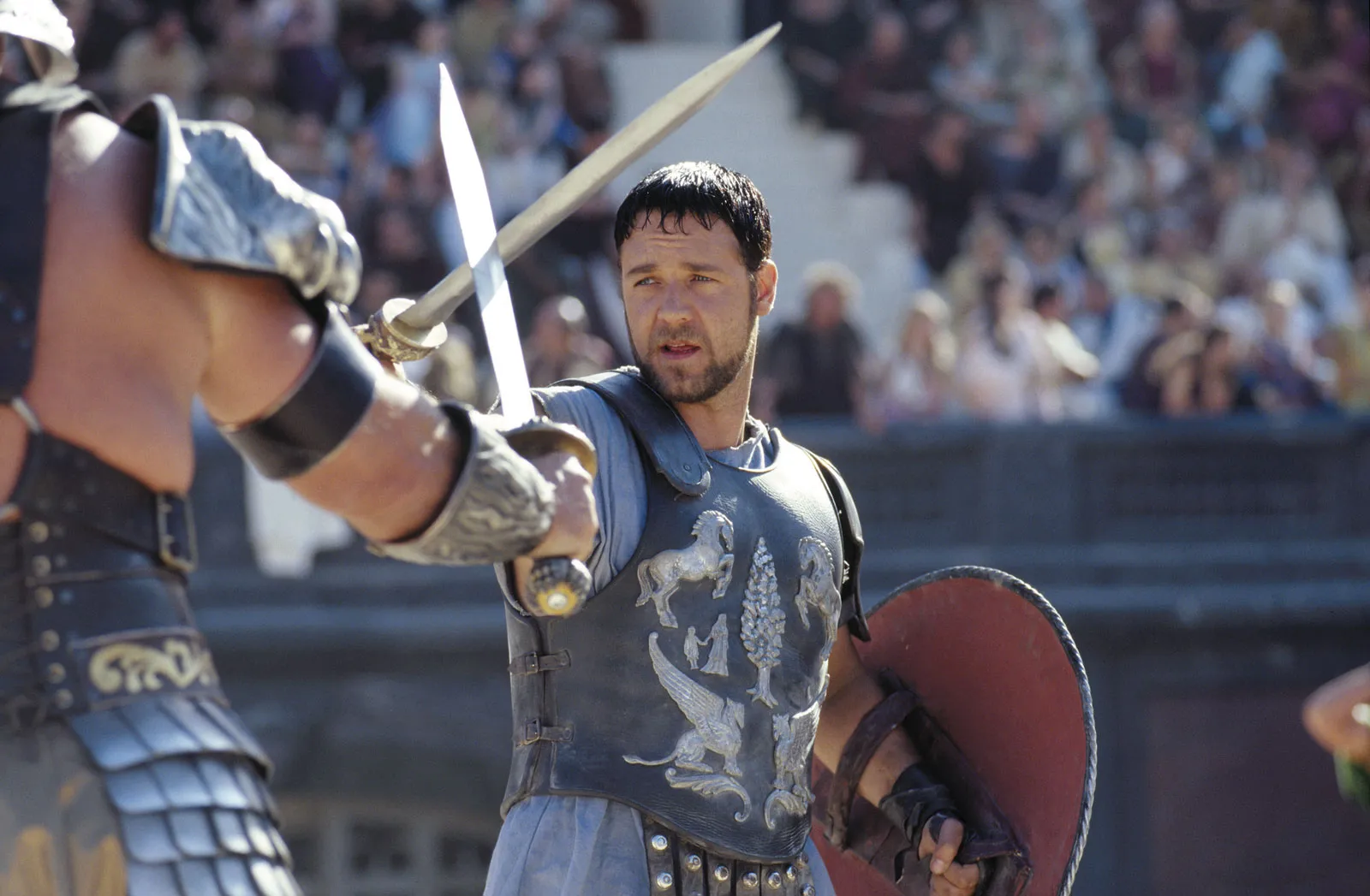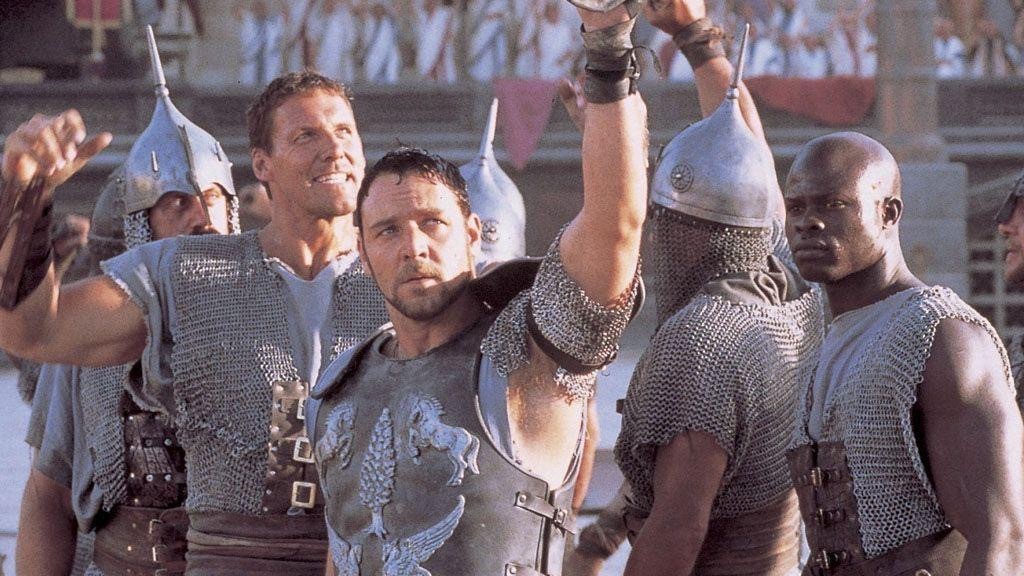Gladiator (2000)
- nguyentruong
- November 26, 2024

Gladiator (2000), directed by Ridley Scott, is a towering epic that blends historical drama, action, and emotional depth into a timeless story of vengeance, honor, and redemption. Set against the backdrop of Ancient Rome, the film follows the journey of Maximus Decimus Meridius (Russell Crowe), a betrayed Roman general who is forced into the life of a gladiator after the murder of his family and the fall from grace orchestrated by the corrupt emperor Commodus (Joaquin Phoenix). Combining breathtaking action sequences with deep emotional resonance, Gladiator stands as a landmark in cinema, earning multiple Academy Awards, including Best Picture and Best Actor for Crowe.
The film opens in the year 180 AD, with Maximus leading the Roman army to a decisive victory against the Germanic tribes. A seasoned and respected general, Maximus is loyal to the reigning Emperor Marcus Aurelius (Richard Harris), who sees in him the qualities of a great leader. However, upon Marcus Aurelius’s death, his son Commodus seizes the throne. Commodus, a spoiled and power-hungry ruler, kills his father in a bid to secure his rule and seeks to eliminate anyone who stands in his way. Maximus, unwilling to serve under such a man, refuses Commodus’s orders and is betrayed. His family is murdered, and he is sold into slavery.
Maximus’s transformation from a powerful general to a lowly gladiator is one of the film’s emotional centers. After enduring hardship and suffering, he rises through the ranks of the gladiatorial games, gaining the attention of the Roman public for his skill, bravery, and resolve. His journey becomes one of survival and revenge, as he seeks to confront the man who destroyed his life—Commodus—and avenge his family. Along the way, he forms alliances with other gladiators, including Juba (Djimon Hounsou), and gains the favor of Proximo (Oliver Reed), a former gladiator turned trainer who sees in Maximus a man who could be more than just a slave—he could be the key to restoring the Republic.
Russell Crowe’s performance as Maximus is nothing short of iconic. The role is a perfect fit for Crowe, as he embodies the character’s inner turmoil, strength, and vulnerability. Maximus is a man of honor, bound by a sense of duty and loyalty, but his desire for revenge and his grief over the loss of his family drive him to the brink of madness. Crowe’s portrayal of Maximus is grounded, honest, and deeply human, making his character’s journey both compelling and emotionally resonant. Whether in moments of quiet reflection or in the midst of intense battle, Crowe’s performance brings Maximus to life as a character who is both a hero and a man struggling with his own demons.
Joaquin Phoenix delivers a chilling performance as Commodus, the film’s primary antagonist. Commodus is a man consumed by insecurities and a desperate need for validation, constantly seeking the approval of the people of Rome, yet simultaneously unable to escape the deep resentment he harbors toward his father. Phoenix’s portrayal of Commodus is complex, offering both vulnerability and menace, as the character’s cruelty is often rooted in his deep need for love and recognition. Commodus’s manipulative and sadistic nature contrasts sharply with Maximus’s honor and sense of justice, making their eventual confrontation all the more compelling. Phoenix’s performance earned him an Academy Award nomination for Best Supporting Actor, and his portrayal of the tragic, power-hungry emperor is a highlight of the film.
The supporting cast also shines, particularly Connie Nielsen as Lucilla, Commodus’s sister, who is caught between her loyalty to her brother and her love for Maximus. Her role in the story provides a human touch, as she becomes an ally to Maximus, though her position is precarious. Richard Harris is excellent as Marcus Aurelius, the wise and noble emperor whose tragic death sets the stage for the entire conflict. And Oliver Reed, in his final film role as Proximo, brings depth and humor to his character, serving as both a mentor to Maximus and a reminder of the brutality of the gladiatorial life.
The film’s direction, cinematography, and action sequences are equally outstanding. Ridley Scott crafts a visceral and immersive experience, using sweeping landscapes and intimate, emotional close-ups to capture both the grandeur of Rome and the personal struggles of its characters. The battle scenes are brutal and intense, with Scott’s use of slow-motion and close-quarter combat adding weight to each clash. The opening battle, in which Maximus leads his troops into war against the Germanic tribes, is a stunningly choreographed sequence that sets the tone for the film’s high stakes. The gladiator fights that follow are equally thrilling, showcasing both the spectacle and the underlying human cost of the arena.
The use of practical effects and minimal CGI adds to the realism and visceral nature of the action. In particular, the film’s depiction of the Colosseum—both as an architectural marvel and a place of bloodshed—is a haunting reminder of the excesses of imperial Rome. The brutality of the gladiatorial games, as well as the political machinations of the empire, is brought to life with a striking sense of realism that transports the audience into the world of Ancient Rome.
Hans Zimmer’s score for Gladiator is iconic, with its soaring, emotional themes enhancing the film’s grandeur and gravitas. The music blends traditional orchestral elements with more contemporary sounds, creating a powerful soundtrack that captures the film’s epic scope. The main theme, in particular, is haunting and evocative, becoming synonymous with the film itself. The music intensifies key moments, from the battle scenes to the quieter, more reflective moments, underscoring the emotional weight of Maximus’s journey.
At its core, Gladiator is a story of revenge, but it’s also a meditation on power, corruption, and the price of honor. Maximus’s journey is not just about defeating his enemies; it’s about reclaiming his sense of identity and his connection to his family. The film’s exploration of the idea of legacy—both personal and political—is central to the story, as Maximus seeks not only to restore the Republic but to give his family the honor they were denied by Commodus’s treachery. In this way, the film becomes a broader commentary on the cyclical nature of history, the corrupting influence of power, and the human desire for justice.
The film’s conclusion is both satisfying and tragic. Maximus’s final moments, after achieving his revenge against Commodus, are deeply emotional, reflecting his journey from a man broken by loss to a figure of heroic sacrifice. His death, while inevitable, feels like the culmination of everything he has fought for, both for himself and for the future of Rome. The closing shot, in which Maximus is reunited with his family in the afterlife, offers a sense of peace and redemption, making his struggle feel meaningful beyond the physical battles he fought.
Gladiator remains one of the greatest epics in modern cinema, combining breathtaking action with deep emotional resonance. Its themes of honor, revenge, and redemption, along with its powerful performances, stunning direction, and iconic score, ensure that it has endured as a classic. The film’s impact on the genre of historical epics is immeasurable, and its legacy continues to influence filmmakers and audiences alike. Gladiator is a film that speaks to the timeless nature of the human spirit—its capacity for greatness, its vulnerability, and its unyielding quest for justice.











